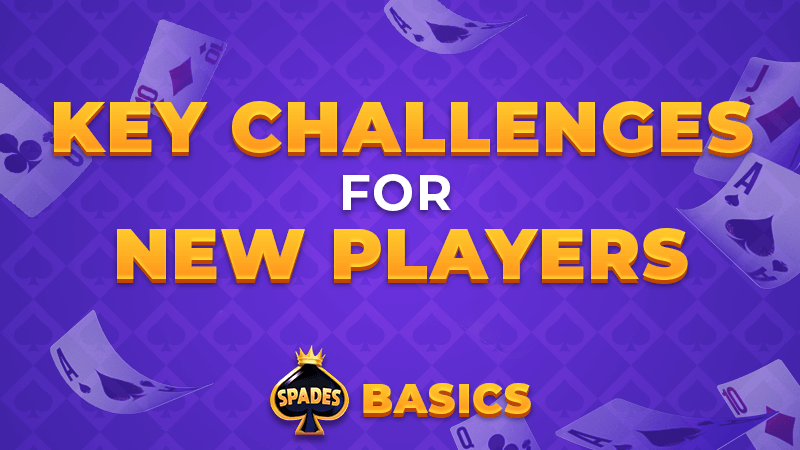Key Challenges for New Spades Players

Below, we’ll walk through the most frequent habits and tendencies that hold new players back. Along the way, you’ll see practical tips for turning these challenges into opportunities for improvement.
1. Overestimating Your Hand
One of the earliest traps beginners fall into is believing their hand is stronger than it really is. It’s tempting to see a single Ace or King and feel like you’re set to win multiple tricks. The reality is that Spades is about your whole hand, not just one flashy card. A lone Ace in Hearts might get pulled out early, leaving you without backup. One or two Spades don’t guarantee control either – especially if your opponents are holding more.
Key takeaway:
- Judge the strength of your hand by its overall balance, not by isolated cards.
- Look for supporting cards that make your high ones reliable.
Thinking in terms of overall structure rather than isolated strength will help you make bids that are accurate and achievable.
2. Underestimating the Importance of Bidding
New players sometimes treat bidding as a formality, tossing out a number without much thought. But bidding is one of the most critical parts of the game. It sets the stage for the entire round and gives both you and your partner the roadmap to follow.
If your bid is too high, you risk falling short and taking a heavy penalty. If your bid is too low, you may end up with sandbags that chip away at your score. Worse still, your partner will struggle to understand your intentions, since bidding is the primary way you communicate before play begins.
Key takeaway:
- Count your expected winners carefully before bidding.
- Be consistent and honest so your partner can trust your signals.
3. Forgetting About Sandbags
At first, sandbags seem harmless. After all, a few extra tricks sound like a good thing. But once they pile up, they become a serious burden. Every ten sandbags equals a one-hundred-point penalty, which can erase the gains of several successful rounds.
New players often focus only on reaching their contract, ignoring the long-term consequences of collecting extra tricks. This is especially true when players consistently underbid, thinking it’s safer to play conservatively. While it may protect you from being set in the short term, it can backfire once sandbags start catching up with you.
Key takeaway:
- Don’t always round your bid down.
- Stay mindful of the long-term consequences of piling up extras.
4. Burning Through Spades Too Early
Because Spades are the trump suit, new players often feel eager to play them right away. There is a certain thrill in slamming down a Spade and taking a trick, especially when you’re just learning the game. However, burning through your Spades too quickly can leave you powerless later in the round, when they matter most.
Experienced players know that timing is everything. Spades are not just for taking tricks – they are also for controlling the flow of play.
Key takeaway:
- Save Spades for the right moment – like protecting a Nil or breaking an opponent’s strong run.
- Use the early rounds to observe and gather information before spending your trump cards.
5. Playing Without Your Partner in Mind
Spades is a partnership game, and your success depends heavily on how well you and your partner work together. Beginners often get caught up in their own hands and forget that their choices affect their teammate.
The simplest way to improve this area is to think beyond your own hand. Pay attention to your partner’s bids and the cards they play. Their behavior offers clues about what they need from you. When both partners keep each other in mind, the team becomes much stronger than the sum of its parts.
Key takeaway:
- Treat your partner’s bid as part of your strategy.
- Pay attention to the cards they play – they’re communicating with you throughout the hand.
6. Going Overboard With Nil
Nil bids are exciting. The idea of scoring one hundred points by taking no tricks at all is appealing to new players, who often try Nil more frequently than they should. Unfortunately, without the right kind of hand, Nil can quickly become a disaster.
Before attempting Nil, check that your hand has mostly low cards and that your Spades are especially weak. Even then, remember that your partner has to help you succeed, which means Nil is as much about teamwork as it is about your own hand. Use it selectively, and it will become a powerful tool rather than a recurring setback.
Key takeaway:
- Attempt Nil only when your hand is loaded with low cards, especially in Spades.
- Remember: Nil is a team effort. Your partner must cover you.
7. Forgetting to Watch the Table
One of the most common tendencies among new players is to focus too much on their own cards and forget to watch what everyone else is doing. Spades is a game of information. Every card that is played gives you clues about what remains in opponents’ hands.
Key takeaway:
- Watch every trick, not just your own role in it.
- Build the habit of tracking what’s been played and adjusting on the fly.
Spades rewards teamwork, foresight, and adaptability. If you can avoid the traps that catch many beginners, you’ll not only improve your game but also earn the trust of any partner who sits beside you.

